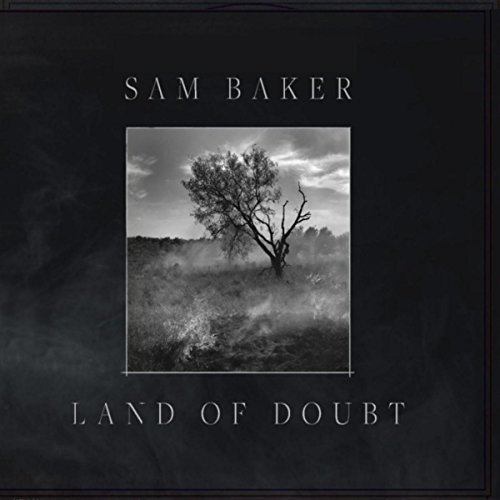Artist: Sam Baker
Album: Land of Doubt
Label: Self-released
Release Date: 6/21/2017

As you may glean from the title, this one’s rather dark. Baker has always been spare musically, while proving to be a convincing storyteller. Here he pares down the lyrics to their bare essence so they read mostly as poems, several with a series of repetitive passages, against a mostly bleak, cinematic electronic soundscape. The other aspect that sets this apart from previous in Austin-based Baker recordings is that it was recorded in Nashville with noted producer Neilson Hubbard. The tight ensemble includes Baker on electric guitar along with go-to guitarist Will Kimbrough, the ’50s jazz trumpet of Don Mitchell and the multi-instrumentalist Hubbard (mostly keys) augmented in several places including the five instrumental interludes by Eamon McLoughlin and David Henry on strings. The music is free of soloing, as all musicians combine to produce a textured orchestral backdrop. The music sometimes reminds me of the jazz work of Bill Laswell or even of Robert Glasper. This recording, a bookend of sorts to his acclaimed 2013 Say Grace will set the stage for a documentary, an original play, and a gallery exhibit of Baker’s visual art.
If you’ve heard Baker before, then perhaps you know the story behind his rather unique singing style—craggy, raspy, unsmooth annunciation in places. It’s a result of a Peruvian train bombing that affected his hearing and, consequently, his singing. For the unaccustomed, it takes a little getting used to. Baker describes the album this way: “This record is a meditation, a reflection on day-to-day life. The goodness, the struggle, the uncertainty. It gives me strength to share doubt. It gives me strength to hear others share doubt. With doubt comes clarity. With doubt comes hope.”
Several songs are inspired by Baker’s international experiences, while others are deeply personal. “Love Is Patient” is about the distance that can seep into a long-term relationship. “Leave” is a direct acrimonious statement, while “Peace Out” is the opposite—a calm acceptance to breakup. A soldier returns home in “Same Kind of Blue” to the sad knowledge that some things never heal. “Moses in the Reeds” is a co-write with Mary Gauthier depicting the sorry state of opiate addiction and single downtrodden mothers. Somehow, amidst these themes, there are melodic, hummable choruses and gorgeous instrumental work.
This is a courageous record and a challenging listen – one where you need to listen to alone, preferably at night when you know you won’t be disturbed or interrupted. In that setting, you can really appreciate the beauty of this work.
—Jim Hynes







Be the first to comment!